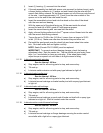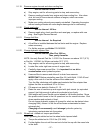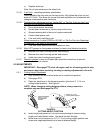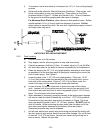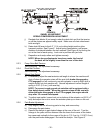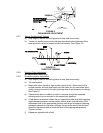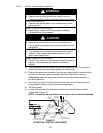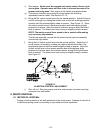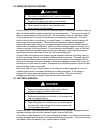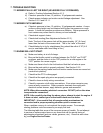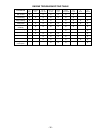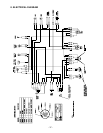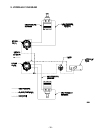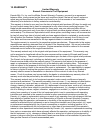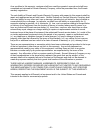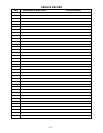
- 34 -
6.2 MERCURY SWITCH DISPOSAL
CAUTION
POTENTIAL HAZARD
♦ The mercury contained in the tilt switch is poisonous.
WHAT CAN HAPPEN
♦ Exposure to mercury can cause severe illness.
HOW TO AVOID THE HAZARD
♦ Never attempt to open or repair the tilt switch
♦ Avoid contact with the mercury.
The tilt switch (PN 1-633782) on this unit contains mercury, a hazardous material. Mercury
that is outside a sealed container vaporizes at room temperature. The vapors are harmful.
Mercury can be absorbed through the skin. Do not attempt to open or repair this switch.
A very small amount of mercury is contained in a hermetically sealed body. The steel
switch is then potted in a hard epoxy in a plastic case. It is unlikely that the mercury will
ever escape from the enclosure. These high performance and reliable inexpensive
switches are recyclable. Mercury is an important and beneficial compound but requires
special care in handling and disposal. When used and managed properly, mercury is not
a threat to people or the environment. This information is presented to users so that they
are aware that these switches contain mercury and will apply sound disposal practices
when these devices reach their normal end of life or are damaged.
Several states have passed laws concerning the disposal of devices containing mercury.
In all the remaining states it is advisable to follow similar procedures. The laws state that
these sealed devices contain mercury and should not be placed in the garbage until the
mercury is removed and reused, recycled or otherwise managed to insure that it does not
become part of solid waste or waters. Management and disposal practices must be within
relevant federal, state or local laws.
Return the switch to your Exmark dealer if it is faulty and is being replaced or if the unit
containing the switch is no longer operating and is being scrapped. If the switch is
damaged or broken open use extreme caution in handling. Call you local waste
management authority or Exmark Customer Service for instructions.
6.3 BATTERY DISPOSAL
DANGER
POTENTIAL HAZARD
♦ Battery electrolyte contains sulfuric acid, which is
poisonous and can cause severe burns
WHAT CAN HAPPEN
♦ Swallowing electrolyte can be fatal or if it touches skin
can cause severe burns.
HOW TO AVOID THE HAZARD
♦ Wear safety glasses to shield eyes, and rubber gloves
to protect skin and clothing when handling electrolyte.
♦ Do not swallow electrolyte.
Federal law states that batteries should not be placed in the garbage. Management and
disposal practices must be within relevant federal, state or local laws.
If a battery is being replaced or if the unit containing the battery is no longer operating and
is being scrapped, take the battery to a local certified recycling center. If no local recycling
is available, return the battery to any certified battery reseller.



